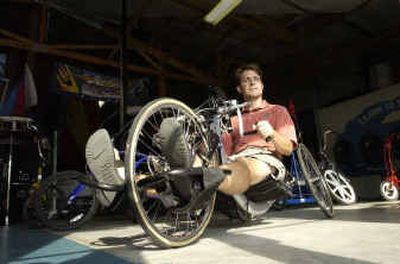Setting others free

HAYDEN — Miles Moore watched people with disabilities regain their sense of adventure on modified bikes and sailboats. It happened every time he arranged a group outing.
Students with spinal cord injuries learned to steer sailboats with their chins, and to savor blustery days on Lake Coeur d’Alene. Amputees sped down hills on specially designed skis and hand-powered bikes.
But the adrenaline rush ended when Moore, the instructor, packed up the gear. Few students had access to modified outdoor recreational equipment outside of class. They had to wait for the next program offered through Spokane Parks and Recreation, or North Idaho College.
That frustrated Moore, a 41-year-old sailing instructor and former employee of the Idaho Department of Vocational Rehabilitation. In 1996, he started the Center for Assistive Recreational Technology, or CART, in his living room.
CART sells outdoor gear designed for people with disabilities. Moore researches different brands, and helps people find a good fit.
“I wanted to help them get their own equipment,” said Moore, who has degrees in recreational therapy and rehab counseling. “I didn’t want them to have to be dependent on a program.”
CART was a part-time venture for years. In April, Moore opened a storefront in Hayden and made it a full-time endeavor.
CART’s storefront is crammed with bikes, skis, kayaks and sailboats. Among the offerings: a $1,300 “stepper bike” for people with knee trouble or cognitive disabilities who can’t pedal in a circle, and a $3,000 side-by-side tandem.
The tandem is made by a Minnesota company, Just Two Bikes. It can be used by a visually impaired person with a partner, or by people who have balance problems. A traditional tandem requires a pedal speed of four- to five miles per hour to maintain balance. The side-by-side model is more lenient, and it’s popular with a lot of able-bodied cyclists as well, Moore said.
“My wife loves it, because she can read while we’re biking,” he said.
According to Census figures, about 50 million Americans — or one-sixth of the U.S. population — have a disability. Disabilities are defined as severe vision or hearing loss, or a condition that hinders an individual’s ability to learn, walk or perform routine tasks.
Moore hopes to reach that population in the Inland Northwest, and others besides. CART’s financial success will depend on its ability attract a broad range of customers, he said.
“It would be very difficult to make a living by selling only to people with disabilities,” he said. “It’s a narrow market. It would be tough.”
Moore is counting on the crossover appeal of many the products CART stocks. Women, for instance, buy kayaks outfitted with foot pedals, because it gives them a leg-power option when their upper body strength wanes, he said. Recumbent bikes are also popular with a broad audience. People with neck and back injuries and carpal tunnel use them because they take the hunched back out of bike-riding and the pressure off the rider’s wrists.
CART also sells regular sailboats and kayaks — big-ticket items that will underwrite the cost of stocking the specialty items, Moore said.
Moore attends about six trade shows each year to introduce the public to CART’s products. Some customers also find him over the Internet, but most live within driving distance. Outdoor equipment is something people like to see and try out before a purchase, he said.
“A lot of people with disabilities don’t even know this stuff is out here,” said Scott Bailey, CART’s part-time bike technician.
Bailey, a double-amputee, races hand cycles, snow skis and water skis. It’s a continuation of the active lifestyle he led before he lost the mobility in his lower body to a spinal cord injury, and his legs to a bone infection.
Bailey works full-time as a wheelchair tech at St. Luke’s Rehabilitation Institute in Spokane, where he deals with patients with spinal cord injuries, and knee and hip replacements.
He knows of a few companies that sell racing wheelchairs, but not any other retail outlets that carry a wide array of adaptive outdoor gear.
“You can order it over the Internet, but you don’t have the chance to get in it, and try it out,” he said.